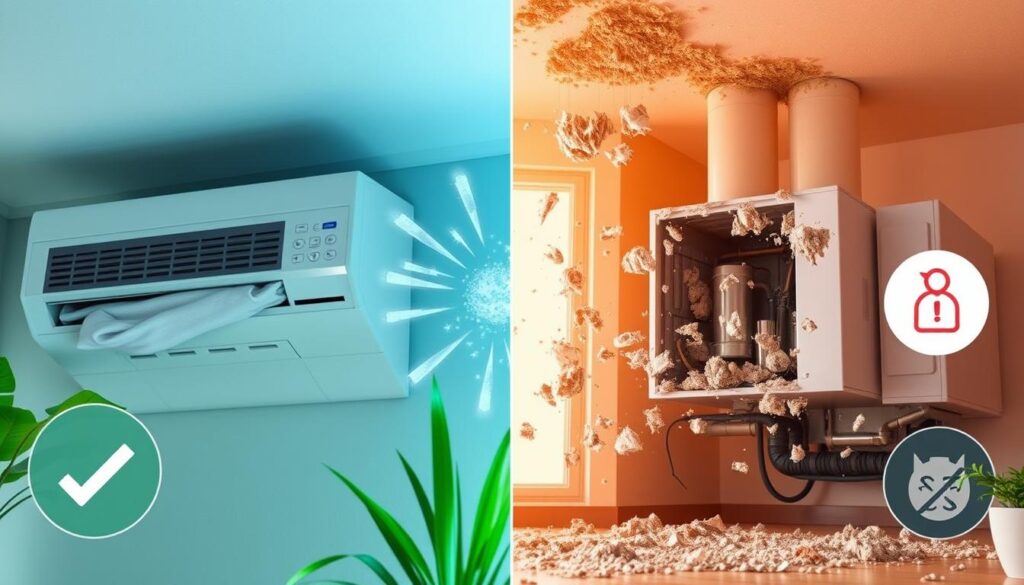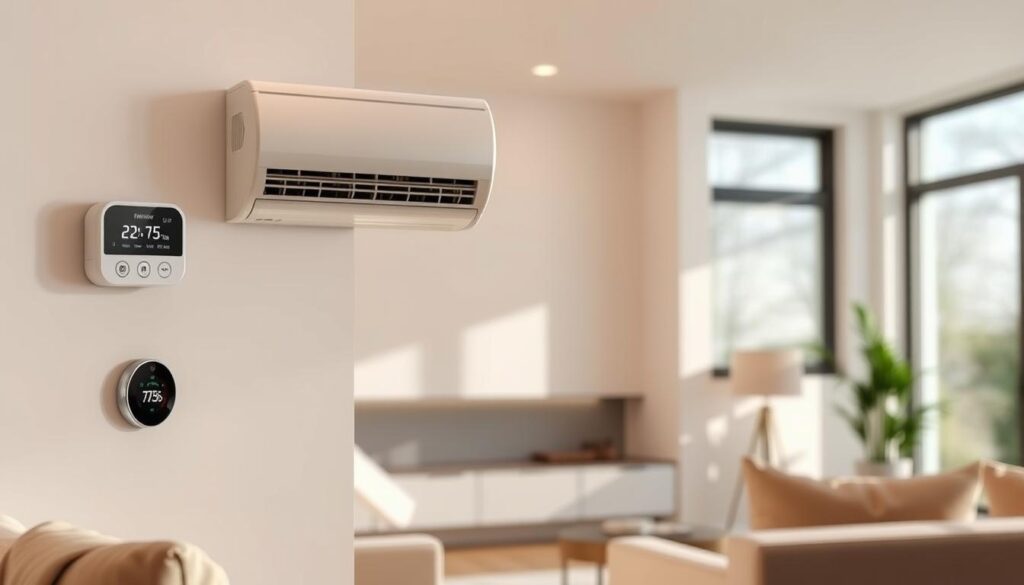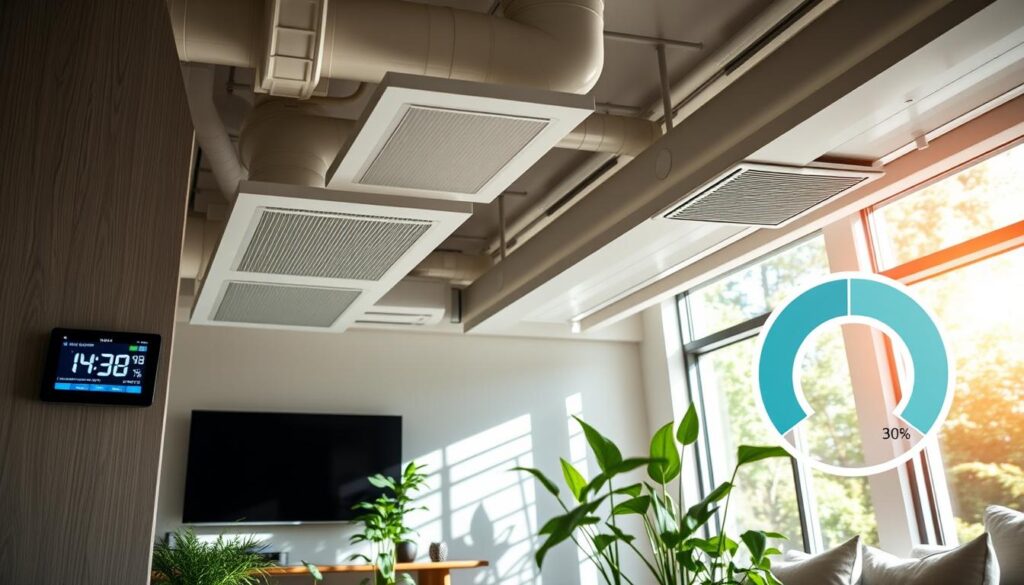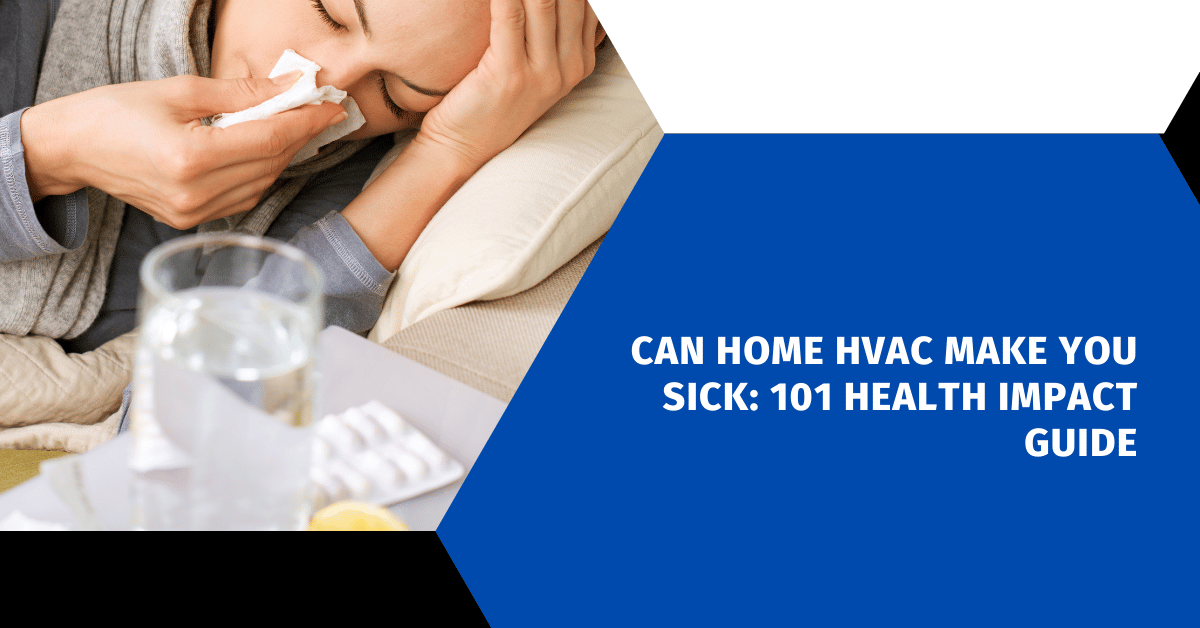Affiliate Disclosure
HVAC Guide Guys is a participant in the Amazon Services LLC Associates Program, an affiliate advertising program designed to provide a means for sites to earn advertising fees by advertising and linking to Amazon.
Can Home HVAC Make You Sick? As you settle into your cozy home, the hum of the HVAC system may provide a comforting backdrop to your daily life. But have you ever stopped to consider the potential health implications of the very system that keeps you comfortable? The relationship between your home’s heating, ventilation, and air conditioning (HVAC) and your well-being is complex. Understanding this impact can help you make informed decisions to protect your health.

Key Takeaways
- HVAC systems can contribute to the spread of airborne illnesses and affect the body’s ability to fight them.
- Poorly maintained HVAC units can lead to the growth of bacteria and fungi, causing respiratory problems.
- Spending extended time in air-conditioned environments can lead to skin dryness and eye irritation.
- Sudden temperature changes and lack of humidity control can exacerbate respiratory symptoms.
- Regular maintenance and using high-efficiency filters are essential for maintaining healthy indoor air quality.
Table of Contents
Understanding the Link Between HVAC Systems and Health
Your home’s HVAC system is key to a comfy and healthy indoor space. But, did you know it can also affect your health? We’ll look at HVAC parts, air quality, and indoor pollutants that harm health.
Basic Components of HVAC Systems
HVAC systems have many parts like outdoor units, electrical bits, filters, and ducts. They work together to control temperature, humidity, and air flow. You might have a gravity, radiant, or forced-air system, each with its own needs.
How Air Quality Affects Health
Indoor air quality greatly impacts your breathing, brain function, and overall health. Keeping your HVAC in good shape is vital for clean air and less health risks.
Common Indoor Air Pollutants
Some common indoor pollutants include:
- Dust
- Mold
- Bacteria
- Viruses
These can lead to breathing problems and allergies. Regular HVAC upkeep can lessen these pollutants’ effects.
“According to the American College of Allergists, 50% of all illnesses are either caused by or aggravated by polluted indoor air.”
Knowing how your HVAC affects air quality helps you create a healthier home. This way, you can reduce health risks linked to your home’s climate control.
Can Home HVAC Make You Sick: Key Risk Factors
Home HVAC systems are meant to make your home comfortable and air cleaner. But, they can also be harmful if not kept in good shape. Poor ventilation, not keeping the system clean, and pollutants in the air are big risks.
Dirty HVAC systems can harbor mold and bacteria. These can spread through your home, causing breathing problems. Low humidity from air conditioning also makes you more likely to get sick, as your body’s defenses are weakened.
A study in the International Journal of Epidemiology showed people in air-conditioned offices got sicker more often. Harvard research also found students in hot dorms without AC did worse on tests than those with AC.
To avoid health problems from your HVAC, clean and maintain it regularly. Change air filters every 3-6 months and service the unit yearly. Fix mold or mildew fast. These steps help keep your air clean and reduce HVAC health risks.
| Risk Factor | Potential Health Impact |
|---|---|
| Poor Ventilation | Buildup of indoor air pollutants, increased risk of respiratory issues |
| Inadequate System Maintenance | Microbial growth, distribution of contaminants, triggering of allergies and asthma |
| Low Humidity Levels | Increased susceptibility to viral infections, dry eyes and nasal passages |
Keeping your HVAC in good shape is key to clean air and health. By tackling these risks, you can enjoy a healthy home without HVAC-related health issues.
Explore Our HVAC Shop
Looking for top-rated HVAC tools, parts, and accessories? Visit our shop and find the perfect solution for your needs.
Visit the ShopSick Building Syndrome: A Common HVAC-Related Issue
Sick Building Syndrome (SBS) is a common problem in air-conditioned buildings. It causes health issues for people inside. Knowing the symptoms, risk factors, and how to prevent it is key to a healthy indoor space.
Primary Symptoms to Watch For
People with Sick Building Syndrome might have dry, itchy eyes or stuffy noses. They might also feel headaches, get tired easily, or have nausea. These signs often point to poor indoor air quality and HVAC system issues.
Risk Factors and Contributing Elements
Several things can lead to Sick Building Syndrome. Poor ventilation, moisture, and molds are big contributors. Also, indoor pollutants from products and outdoor pollution can worsen the problem.
Prevention Strategies
- Keeping your HVAC system in good shape is essential. This includes changing filters and cleaning ducts to keep air clean.
- Good ventilation and controlling humidity can prevent pollutants and mold growth.
- Using air scrubbers, dehumidifiers, and efficient HVAC systems can improve air quality and fight SBS.
By tackling the root causes and using prevention methods, you can make your indoor space healthier. This helps reduce the effects of Sick Building Syndrome.
“Improving indoor air quality is crucial in combating Sick Building Syndrome and promoting the well-being of building occupants.”
Explore Our HVAC Shop
Looking for top-rated HVAC tools, parts, and accessories? Visit our shop and find the perfect solution for your needs.
Visit the ShopRespiratory Problems and HVAC Systems
Your HVAC system plays a big role in your breathing health. If it’s not working right, it can cause many breathing problems. It’s important to know how HVAC systems and breathing issues are connected to keep your air clean.
HVAC systems can spread indoor air pollutants. Dirty ducts and filters can make air quality bad. Also, HVAC problems can make temperatures in your home uneven, which can hurt your breathing.
When HVAC systems don’t handle humidity well, it can dry out your skin, nose, and eyes. This can make breathing problems worse. You might feel like you’re having trouble breathing, wheezing, or coughing. Your eyes and nose might get itchy and watery too.
In some cases, bad HVAC systems can grow harmful germs. This can lead to serious illnesses like Legionnaires’ Disease. If you’re having breathing problems, getting medical help might mean they check your HVAC system. This can help make the air in your home better and fix your breathing issues for good.
| Issue | Potential Respiratory Symptoms | Preventative Measures |
|---|---|---|
| Dirty ductwork and filters | Breathing difficulties, wheezing, coughing | Regular HVAC system maintenance and filter changes |
| Fluctuating temperatures | Irritated nasal passages, dry eyes | Maintain consistent indoor temperature settings |
| Improper humidity levels | Dry skin, nasal irritation, eye discomfort | Install a humidifier or dehumidifier as needed |
| Microbial growth | Severe respiratory issues, Legionnaires’ Disease | Promptly address any HVAC system issues and maintain cleanliness |
Knowing how HVAC systems can affect your breathing and taking steps to keep the air clean is key. This way, you can make your home or work space healthier. It helps keep your breathing problems at bay.
Impact on Eye Health and Vision
Many people don’t think about how HVAC systems affect their eyes. Air conditioning can make your eyes dry, leading to irritation and blurred vision. This is known as Dry Eye Syndrome and is common in air-conditioned spaces.
Dry Eye Syndrome
Low humidity from air conditioning can make your tear film evaporate faster. This can cause redness, irritation, and a burning feeling in your eyes. Dry air can also lead to eye strain and headaches.
Keeping humidity levels around 45% can help prevent dry eye problems. Taking breaks from air-conditioned areas and using artificial tears can also help.
Prevention and Treatment Options
- Keep indoor humidity levels between 30-50% to prevent excessive dryness
- Take regular breaks from air-conditioned environments to give your eyes a chance to recover
- Use over-the-counter eye drops or artificial tears to lubricate and soothe dry eyes
- Adjust the air conditioning temperature and fan speed to maintain a comfortable, but not overly dry, environment
- Consider using a humidifier to add moisture back into the air
- Blink more often to help spread tears across the eyes
Being aware of how HVAC systems affect your eyes can help. Taking steps to address this issue can prevent and manage Dry Eye Syndrome. This makes for a more comfortable and healthy indoor space.
Explore Our HVAC Shop
Looking for top-rated HVAC tools, parts, and accessories? Visit our shop and find the perfect solution for your needs.
Visit the ShopTemperature Regulation and Body Adaptation
How your body reacts to temperature changes can be affected by HVAC systems. Using air conditioning a lot can make it harder for your body to adjust to different temperatures.
The “adaptive comfort model” shows that too much air conditioning can lower your tolerance for heat. Moving between cool and warm places can make you feel uncomfortable. This can cause problems like:
- Difficulty coping with hot temperatures after extended AC use
- Feeling chilly or uncomfortable in non-air-conditioned spaces
- Increased susceptibility to temperature-related health problems
To help your body adapt better, experts suggest slowly changing the temperature and using less air conditioning. Getting used to different temperatures can improve your comfort and health. This also helps save energy and is better for the environment.
| Statistic | Insight |
|---|---|
| 8% of people who work in unhealthy indoor air environments experienced headaches 1-3 days a month, and 8% had daily headaches. | Prolonged exposure to poor indoor air quality, often exacerbated by HVAC systems, can lead to increased frequency and severity of headaches. |
| A 2018 Harvard study revealed that students living in dorms without air conditioning during hot summer months did worse on cognitive tests compared to those with cool central air. | Exposure to comfortable, temperature-regulated environments can positively impact cognitive performance, particularly in hot weather conditions. |
| The lack of humidity in air-conditioned spaces can lead to dry eyes, resulting in irritation, itchiness, and blurry vision. | Improper humidity levels in HVAC-controlled spaces can contribute to eye health issues, highlighting the importance of balanced temperature and moisture regulation. |

Understanding how HVAC systems affect your body’s temperature control and adaptation is key. This knowledge helps you make better choices about your indoor climate. It also leads to better comfort and health.
Effects on Sleep Quality and Comfort
A good HVAC system can really help your sleep. Experts say the best room temperature for sleep is between 60-67°F. Air conditioning can help keep this temperature, which might make your sleep better. But, too much cooling can mess with your sleep, so finding the right balance is key.
Optimal Temperature Settings
The National Sleep Foundation says the best sleep temperature is 60 to 67 degrees Fahrenheit at bedtime. This lets your body naturally cool down, which is important for good sleep. Setting your HVAC to this temperature can make your sleep space more comfortable and help you sleep better.
Nighttime Considerations
- Gradually adjust the temperature: Sudden temperature changes can wake you up. Slowly change the temperature a few degrees before bed to get comfortable.
- Maintain proper humidity levels: Too dry air from air conditioning can be uncomfortable and disrupt sleep. Make sure your HVAC keeps humidity levels right to avoid this.
- Address unusual HVAC sounds: If your HVAC makes strange noises like grinding or banging, get it checked by a pro. This can prevent health problems and keep you sleeping well.
Knowing the best temperature and taking care of nighttime issues can make your HVAC system help you sleep better. Enjoy a more comfortable and restful sleep.
Explore Our HVAC Shop
Looking for top-rated HVAC tools, parts, and accessories? Visit our shop and find the perfect solution for your needs.
Visit the ShopMaintenance Tips for Healthier Indoor Air
Keeping your HVAC system in good shape is key for better indoor air. Regular care can lower health risks from bad air. Here are some important tips to keep your air clean and safe:
- Change air filters often. Experts say to swap them every 30 to 90 days, based on how much you use it and your home’s conditions.
- Get professional HVAC checks and tune-ups yearly. This finds problems like mold or too much dust that can harm air quality.
- Clean your air ducts and vents to get rid of dust, debris, and harmful stuff that moves around your home.
- Look for signs of wear or damage on your HVAC system and fix it fast to avoid bigger problems and health risks.
- Think about getting a smart thermostat. It can make your home more energy-efficient and comfortable, which means better air.
By doing these HVAC maintenance tips, you can keep your indoor space clean and healthy. This improves your well-being. Remember, taking care of your HVAC system ahead of time is the best way to avoid health issues.
| Maintenance Task | Frequency | Benefits |
|---|---|---|
| Air filter replacement | Every 30-90 days | Removes airborne contaminants and improves indoor air quality |
| HVAC system inspection | Annually | Identifies potential issues and ensures optimal performance |
| Air duct cleaning | As needed | Removes buildup of dust, debris, and pollutants |
| Thermostat upgrade | As needed | Enhances energy efficiency and indoor comfort |
Regular HVAC maintenance greatly improves your indoor air quality and health. By following these tips, you can make your home a healthier place for you and your family.
“Proactive maintenance is the best defense against HVAC-related health concerns and ensures systems contribute positively to indoor air quality.”
The Role of Humidity in HVAC Health Impact
Keeping the right humidity inside is key for your health and comfort. Experts say the best humidity is between 35 and 60 percent. If it’s too high or too low, it can affect your well-being.
Ideal Humidity Levels
Too little humidity, under 35 percent, makes you more likely to get sick. It also makes dry skin and eyes worse. But, humidity over 60 percent can lead to mold and allergens, causing health problems.
Humidity Control Methods
- Whole-home humidification systems: These integrated HVAC components can automatically maintain optimal humidity levels throughout your living space.
- Portable humidifiers: Smaller, standalone units that can be placed in specific rooms to boost humidity as needed.
- Dehumidifiers: Devices that remove excess moisture from the air, useful in areas with high humidity.
It’s important to control humidity for a healthy home. Keeping humidity in the right range helps prevent respiratory issues and makes your home more comfortable.
| Humidity Level | Recommended Range | Health Implications |
|---|---|---|
| Low Humidity | Below 35% | Increased susceptibility to respiratory infections, dry skin and eyes |
| Ideal Humidity | 35-60% | Optimal for health and comfort |
| High Humidity | Above 60% | Promotes mold, dust mites, and other allergens |

By keeping humidity at the right levels, you make your home healthier and more comfortable. To keep your HVAC system working right, get regular checks from a trusted HVAC expert.
Explore Our HVAC Shop
Looking for top-rated HVAC tools, parts, and accessories? Visit our shop and find the perfect solution for your needs.
Visit the ShopImpact on Allergies and Asthma
Your home’s HVAC system plays a big role in managing allergies and asthma. A well-kept system filters out allergens like pollen, pet dander, dust mites, mold, and mildew. But, a neglected system can make these irritants worse, spreading them around your home.
Keeping your HVAC filters clean, especially with high-efficiency particulate air (HEPA) filters, helps a lot. Also, getting your ductwork professionally cleaned can remove built-up contaminants.
If you have allergies or asthma, take care of your HVAC system. Symptoms like sneezing, coughing, itchy eyes, and nasal congestion may indicate an issue with your HVAC system. A leaky or broken system can also release harmful carbon monoxide.
| Common HVAC-Related Allergy Triggers | Mitigation Strategies |
|---|---|
|
|
Keeping the right humidity in your home is key for allergies and asthma. Too little humidity can cause symptoms like non-allergic rhinitis, dry skin, and nosebleeds. Using a whole-house humidifier can help.
By keeping your HVAC in good shape and fixing problems fast, you can make your home healthier. This helps manage allergies and asthma better. Services like those from NEXGEN ensure your HVAC system works well and filters out allergens.
Impact on Immune System Function
Your home’s HVAC system can surprisingly affect your immune system. Poor maintenance or wrong operation can harm your indoor air and environment. This can weaken your immune function.
Exposure to HVAC immune system effects can happen in many ways. Fast temperature changes and indoor air quality problems like mold and pollutants stress your body. This can make it harder for your immune system to fight off sickness.
- A study found that people in air-conditioned offices got sick more often than those without AC.
- Researchers found that every 1-degree drop in indoor temperature raised blood pressure.
- Long-term air conditioning use can cause heat intolerance, fatigue, and trouble regulating body temperature.
But, there’s a silver lining. Keeping temperatures steady, humidity right, and air clean can boost your immune system. Also, getting used to different temperatures can make your body stronger over time.
“Continuous exposure to cold air can lower the immune system’s efficiency, making individuals more susceptible to common illnesses.”
Knowing the HVAC immune system effects and taking steps to improve indoor air quality can help. This way, you can make your home a healthier place for your well-being.
Conclusion
HVAC systems don’t directly cause illness, but they can affect your health. Keeping your system well-maintained and clean is key. It helps reduce health risks linked to HVAC use.
Regular maintenance is crucial. It includes changing filters, cleaning ducts, and getting professional help. This reduces air pollution and fights airborne viruses.
Using HEPA filters, air purifiers, and humidifiers can also help. They improve indoor air quality. This protects you from respiratory problems, allergies, and other health issues related to HVAC.
Focus on indoor air quality management and a healthy home environment. This way, you can enjoy your air conditioning system’s comfort. You won’t have to worry about your health.

